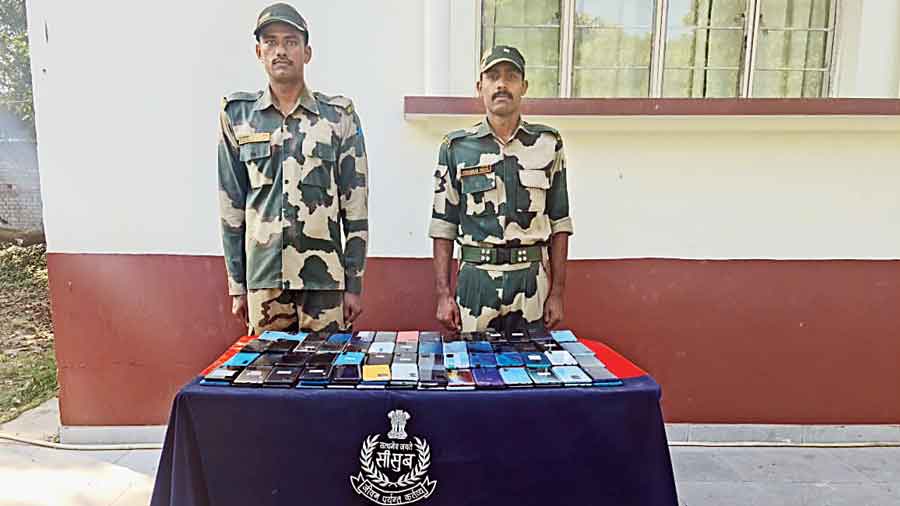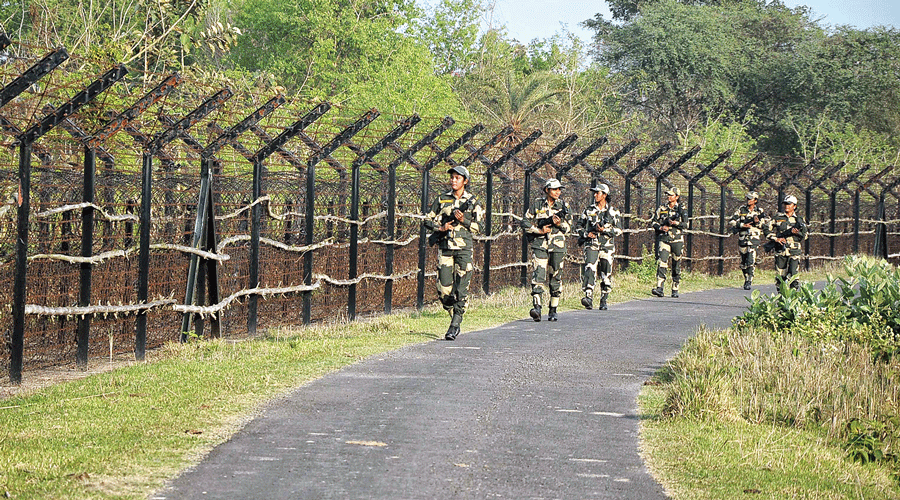BSF personnel have noticed a new technique of smuggling smartphones to Bangladesh by putting them in plastic containers tied to banana stems and setting them afloat on rivers.
Over 300 pieces of expensive smartphones were seized by a BSF team of the70th battalion posted at border outpost Lodhia under Englishbazar police station on Saturday evening.
Those smartphones of different brands were kept in sealed plastic containers, which were tied to banana-stems so that those could be kept afloat.
“Our personnel saw a few plastic containers tied to banana stems floating on the Pagla river towards Bangladesh. They immediately got into the river and retrieved those containers. On opening them,
317 smartphones were found. The estimated total price of those smartphones is Rs 38.83 lakh,” said a BSF official of DIG rank.
The recovered smartphones were handed over to Englishbazar police station by the BSF authorities.
Previously, banana stems were used to smuggle cattle to Bangladesh through waterways, particularly during monsoon when the rivers are swollen.
“But this is altogether a new style of smuggling smartphones to the neighbouring country using the river,” said a BSF official.
Malda shares a nearly 170km-long border with Bangladesh, out of which a 35km stretch is riverine.
The district shares two interstate borders with Jharkhand and Bihar as well.
Sources in the BSF and state intelligence wing said that selling stolen smartphones in the grey markets of Bangladesh meant lucrative business for international smuggling rackets.
Explaining the principle of this business, a police officer told this correspondent: “A stolen smartphone whose original price was Rs 20,000 sells in the grey market in India at half the price. But once it is smuggled across the international border, the price of the same smartphone reaches up to Rs 15,000 in the clandestine market if the gadget is in good condition.”
He added that these better prices made smugglers desperate to send the stolen smartphones to Bangladesh.
A senior police officer cited another reason for smugglers preferring to sell the stolen smartphones in Bangladesh and not anywhere in India.
“In Malda, police have set up special units for recovering stolen mobile phones in the district headquarters and also at all police stations. Soon after a complaint is received, our local police units in coordination with the units of the district headquarter start tracking the device using the IMEI code. The success rate of
recovering phones in Malda in the last few months has been quite commendable. It can be said that it is much easier to track stolen phones in the district or anywhere in India. But once the gadget is smuggled to Bangladesh, it becomes virtually impossible to locate and recover it,” the police officer said.
The success of police in recovering stolen phones from Malda, its neighbouring districts and states, and then handing them over to their owners made smugglers desperate to send the stolen gadgets to Bangladesh at any cost, the officer said.
A senior BSF officer added that greater vigil on borders succeeded in foiling innovative ways of smuggling.
“As the vigil across the international border with Bangladesh has been strongly beefed up, the smugglers have tried to send stolen phones to the neighbouring country in a new way, as it appears, using the riverways. But our patrolling along the land and river borders is relentless and innovative attempts at international smuggling are being foiled,” he said.












